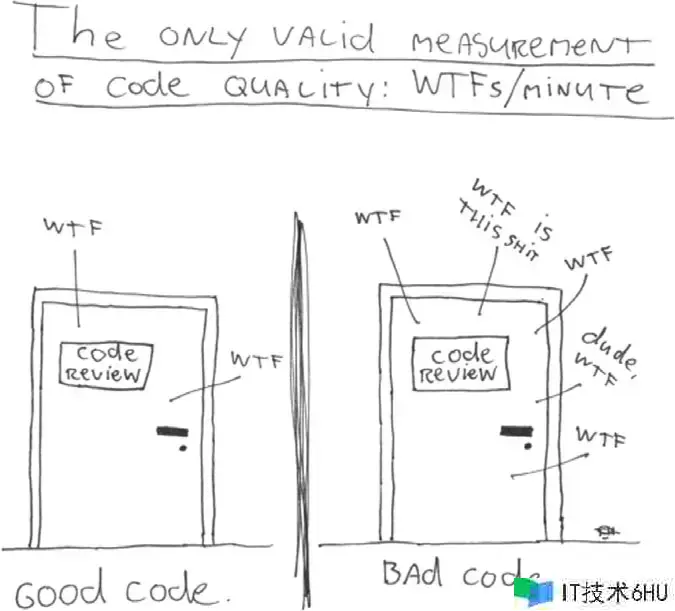Which door represents your code?
哪扇门代表了你的代码?
Which door represents your team or your company?
哪扇门代表了你的团队或你的公司?
Why are we in that room?
咱们为什么会在那个房间里?
Is this just a normal code review or have we found a stream of horrible problems shortly after going live?
这只是是一次普通的代码检查,还是咱们上线后不久就发现了一连串的严重问题?
Are we debugging in a panic, poring over code that we thought worked?
咱们是在惊惧中调试、细心检查咱们以为能够正常作业的代码吗?
Are customers leaving in droves and managers breathing down our necks?
客户们是不是成群结队地脱离,管理者们是不是在咱们背面急切地盯着?
How can we make sure we wind up behind the right door when the going gets tough?
当困难来暂时,咱们怎样才能确保自己终究站在正确的门后边?
The answer is: craftsmanship.
答案是:工匠精力。
单词
Which
哪一个;哪些:用于问询特指的人或物。
例句:Which book do you prefer?(你更喜爱哪一本书?)
door
门:通常指用来进出房间的可移动障碍物。
例句:Please close the door.(请关上门。)
represents
代表;表明:用于阐明某件物品或或人标志或代表的事物或概念。
例句:The dove represents peace.(鸽子标志平和。)
your
你的;你们的:表明一切联系,是一个物主代词。
例句:Is this your umbrella?(这是你的伞吗?)
code
代码:编写的计算机指令集,或表明其他信息、事物的一系列预定信号。
例句:He is writing code for the new software.(他正在为新软件编写代码。)
team
团队:由多个人组成,以一同努力完成特定任务的一组人。
例句:Our team is working on the project.(咱们团队正在进行这个项目。)
company
公司:一个法令实体,由个人、股东或成员组成,供商业或慈悲意图运营。
例句:She works for a multinational company.(她在一家跨国公司作业。)
Why
为什么:提出疑问或寻求原因、理由。
例句:Why did you choose this answer?(你为什么挑选这个答案?)
are
是:表明存在或状况的动词,复数形状。
例句:They are students.(他们是学生。)
we
咱们:代词,指说话者包含对方或其他人的复数方法。
例句:We are going to the movies.(咱们要去看电影。)
in
在……里/内:用于表明方位。
例句:He is in the kitchen.(他在厨房里。)
that
那个;那些:指代特定的事物或状况。
例句:That is my car.(那是我的车。)
room
房间:有墙和屋顶围成的部分空间,通常为了寓居或特定用途。
例句:The meeting will take place in the conference room.(会议将在会议室进行。)
Is
是:表明存在或状况的动词,奇数形状。
例句:Is this seat taken?(这个座位有人吗?)
this
这个;这些:指代临近的事物或状况。
例句:This is my friend.(这是我的朋友。)
just
只是;只是:表明约束,强调某事只要一种解释或状况。
例句:I just finished my homework.(我刚刚完成了我的家庭作业。)
a
一个;一种:不定冠词,用在奇数可数名词前面,表未特指。
例句:I saw a cat in the garden.(我在花园里看到一只猫。)
normal
正常的;常规的:符合规范或预期的平均条件。
例句:His body temperature is normal.(他的体温是正常的。)
code review
代码检查:一种软件质量确保活动,其间开发者通过检查源代码来检查程序中的错误和问题。
例句:We conduct a code review every Friday.(咱们每周五进行代码检查。)
have
有;持有:具有某物,或处于某种状况。
例句:I have a question for you.(我有一个问题要问你。)
found
发现;成立:发现某物,或创建和建立某个安排或制度。
例句:The company was founded in 1984.(该公司成立于1984年。)
a stream
一连串;一系列:一系列接连的事物,常用于比方表达。
例句:A stream of complaints was received.(收到了一连串的投诉。)
of
的:用于表明隶属联系、一切联系或派生联系。
例句:The cover of the book is blue.(书的封面是蓝色的。)
horrible
可怕的;恐怖的:引起惊骇或讨厌的事物。
例句:It was a horrible accident.(那是一同可怕的事端。)
problems
问题;难题:需求解决或答复的作业或状况。
例句:We need to address these problems immediately.(咱们需求马上解决这些问题。)
shortly
不久;很快:在短时刻之后。
例句:She will arrive shortly.(她很快就会抵达。)
after
在……之后:表明时刻上的顺序。
例句:After the movie, we went to a caf.(电影结束后,咱们去了咖啡馆。)
going live
上线:指一个项目、产品或服务开端对外正式运作或可被公众运用的状况。
例句:The website is going live next Monday.(该网站将在下周一上线。)
we
咱们:代词,指说话者包含对方或其他人的复数方法。
例句:We can start the game now.(咱们现在能够开端游戏了。)
debugging
调试:在编程中修复错误和问题的过程。
例句:He spent the whole afternoon debugging the program.(他花了整个下午调试程序。)
panic
惊惧:突然的强烈惊骇,往往导致无序的行为。
例句:The rumor caused a panic among the population.(流言在民众中引起了惊惧。)
poring
细心阅览;深入研讨:细心地阅览或研讨。
例句:She spent hours poring over her textbooks.(她花了几个小时细心阅览她的讲义。)
over
遍及;关于:表明范围或主题。
例句:We discussed the issue over dinner.(咱们在晚餐时评论了这个问题。)
that
那个;指代特定的事物或状况。
例句:Look at that building.(看那栋楼。)
we thought
咱们以为:表达说话者曾经的看法或信仰。
例句:We thought the solution was correct, but it was not.(咱们以为这个解决方案是正确的,但其实不是。)
worked
作业;操作:表明某事运行或进行。
例句:The plan worked perfectly.(方案运行得非常完美。)
customers
顾客:购买商品或服务的人。
例句:We have to find a way to attract more customers.(咱们得找办法招引更多顾客。)
leaving
脱离:去掉或消失。
例句:The train is leaving in five minutes.(火车五分钟后发车。)
droves
成群;一大批:很多的人或动物。
例句:Fans came in droves to see the concert.(成群的粉丝来看音乐会。)
managers
经理;管理者:负责管理或监督他人的人。
例句:Our manager will approve the decision.(咱们的经理将会批准这个决策。)
breathing
呼吸;迫临:引申为或人监督得很紧,喘不过气来。
例句:The deadline is tomorrow, and my boss is breathing down my neck.(截止日期是明天,我的老板总在我背面逼得很紧。)
down
向下;在下面:用于表明方向、方位的下降。
例句:He walked down the stairs.(他走下楼梯。)
our
咱们的:表明一切联系,是一个物主代词。
例句:Our team won the game.(咱们队赢得了竞赛。)
necks
颈部:衔接头部与身体其余部分的部分。
例句:She wore a necklace around her neck.(她在脖子上戴了一条项圈。)
How
如何;怎样:问询方法或办法。
例句:How can I help you?(我怎么帮你?)
can
能;能够:表明有才能或许可去做某事。
例句:Can you open the window?(你能够打开窗户吗?)
make sure
确保:采纳举动以确保某事发生或某状况为真。
例句:Make sure you lock the door before you leave.(脱离前确保你锁上门。)
wind up
结束;终究处于:完成某事或抵达某个状况。
例句:If we don’t pay the bill, we’ll wind up in court.(如果咱们不付账单,咱们终究会上法庭。)
behind
在……后边:身体或物体坐落另一物体的背面。
例句:The sun disappeared behind the clouds.(太阳消失在云层后边。)
the right
正确的;合适的:准确的或最佳的挑选。
例句:Make sure you are on the right path.(确保你在正确的路上。)
when
当;在……时分:用于指代特定时刻或条件。
例句:When I arrived, they were already there.(我抵达时,他们已经在那里了。)
the going gets tough
状况变得艰难:生活或某种状况变得困难或挑战性强。
例句:You must keep trying when the going gets tough.(状况变得艰难时你必须坚持尝试。)
The answer is
答案是:用来提供问题的回答或解决方案。
例句:The answer is simple: more exercise and a healthy diet.(答案很简单:多做运动和健康饮食。)
craftsmanship
工艺;技艺:指手工艺技能或做工精巧。
例句:You can tell the craftsmanship is excellent just by looking at this piece of furniture.(光是看这件家具就知道它的工艺非常精良。)
语法
-
Which door represents your code?
- Which(疑问代词):用来提问,表明从中挑选一个,这儿是指“挑选哪一扇门”。
- represents(动词第三人称奇数现在时):代表,表明某物是某事的标志或代表。
- your(描绘词性物主代词):你的,表明代码归于你。
- code(名词):代码,代表编程中的代码。
-
Which door represents your team or your company?
- Which(疑问代词):和榜首句中的 which 同理。
- represents(动词第三人称奇数现在时):代表,同上。
- your(描绘词性物主代词):你的,表明团队或公司归于你。
- your team or your company(并排名词短语):你的团队或公司,用“or”衔接表明挑选。
- or(连词):或,用于衔接挑选联系中的并排成分。
-
Why are we in that room?
- Why(疑问副词):提问原因。
- are(系动词,复数方法):是,用在 be 动词的现在时态,这儿帮助组成进行时态。
- we(主格人称代词复数):咱们,作为主语。
- in that room(介词短语):在那个房间,用来表明地点。
-
Is this just a normal code review or have we found a stream of horrible problems shortly after going live?
- Is(动词 be 的现在时第三人称奇数):是,这儿用于构成一种情形的断定。
- this(指示代词):这个,指代之前说到的或者行将说到的事物。
- just(副词):只是,表限定。
- a normal code review(名词短语):一次正常的代码检查,由冠词 a、描绘词 normal 和名词 code review 组成。
- or(并排连词):或者,表明两种可能性的挑选。
- have we found(现在完成时的疑问方法):咱们发现了(什么作业),表明动作在过去完成并且可能与现在的状况有关。
- a stream of horrible problems(名词短语):一连串可怕的问题。
- shortly after going live(副词短语):上线之后不久,表明动作的时刻顺序。
- going live(动名词短语):上线,指软件开端对外提供服务的状况。
-
Are we debugging in a panic, poring over code that we thought worked?
- Are(动词 be 的现在进行时):是,用于构成现在进行时态表明正在进行的动作。
- we(主格人称代词):咱们,作为主语。
- debugging(现在分词):调试,表明正在进行的动作。
- in a panic(介词短语):在惊惧中,表明情绪状况。
- poring over(短语动词):细心检查,表明详尽地检查代码的行为。
- code(名词):代码,这儿的方针。
- that we thought worked(定语从句):咱们以为能够作业的,用来修饰前面的 code,其间 thought 用过去式表明对过去状况的认知。
-
Are customers leaving in droves and managers breathing down our necks?
- Are(动词 be 的现在进行时):用于构成现在进行时,表明正在发生的状况。
- customers(名词复数方法):客户,主语之一。
- leaving(现在分词):脱离,这儿与 are合用构成现在进行时。
- in droves(副词短语):成群结队地,表明方法。
- and(并排连词):和,衔接两个并排的动作。
- managers(名词复数方法):管理者,作为另一个主语。
- breathing down our necks(短语动词):在咱们背面紧追不舍,形象地描绘管理者压迫的状况。
-
How can we make sure we wind up behind the right door when the going gets tough?
- How(疑问副词):怎样,用来问方法。
- can(神态动词):能,表明才能或可能性。
- we(主格人称代词):咱们,主语。
- make sure(固定短语):确保,确保某事发生。
- we wind up(短语动词,现在时):咱们终究处于,wind up 表明结束在某状况。
- behind the right door(介词短语):在正确的门后边,表明结尾或方针。
- when(隶属连词):当…的时分,引导时刻状语从句。
- the going gets tough(固定短语):状况变得困难,用来描绘环境或状况的变化。
-
The answer is: craftsmanship.
- The answer is(名词 系动词 补语结构):“答案是”,用来提出问题的答案或解决方案。
- craftsmanship(名词):工匠精力,这儿作为答案的内容。

